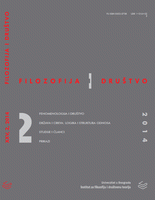Neuroetika i filozofija
Neuroethics and Philosophy
Author(s): Jovan Babić Subject(s): Philosophy
Published by: Institut za filozofiju i društvenu teoriju
Keywords: Neuroscience; neuroethics; explanation; causes and consequences; values; justification; reasons
Summary/Abstract: Neuro-ethics is probably fastest growing part of applied ethics. The main thesis is that certain natural processes in brain and nerves produce certain moral, and immoral, behaviors. All these processes can be explained causally, and (if this is so) neuro-ethics might be the final result of neuroscience. There are some metaphysical and ethical pitfalls to be considered, however, like the (incorrect) conflation of causal explanation and rational justification in definingvalues, not only non-moral values but moral values as well. Certainly, the knowledge of how neurological processes function could help to enhance the quality of human life, not only in coping with defects but also in improving the so-called "normal life". This implies that neuroethics is instrumental, dealing with values which are instrumental as well. However, neuroethics, it seems, aspires to go further than that: to explain how goals come into existence and what their articulation should look like. All of this should be causally explained, or at least explainable; and the main focus of the paper is an analysis of this aspiration. The analysis refers to some important distinctions like the distinction between causes and reasons, explanation and justification, or the one between means and ends. At the end of the paper there is a section about applications, where some of the benefits and risks are summarily indicated, with a conclusion that neuroethics surely might help in advancing the overall quality of human life, individual and social.
Journal: Filozofija i društvo
- Issue Year: 25/2014
- Issue No: 2
- Page Range: 181-203
- Page Count: 23
- Language: Serbian

